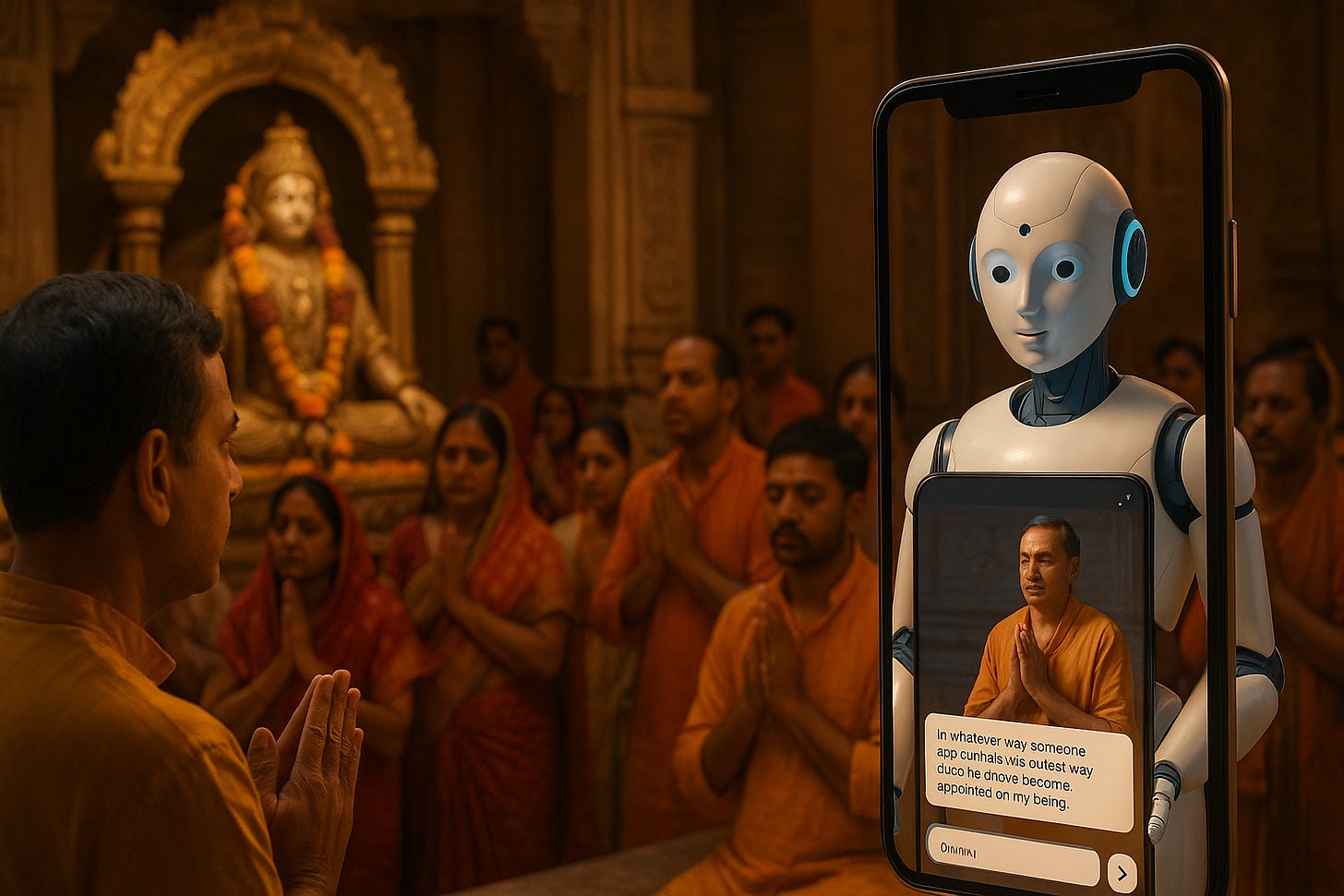AI Becomes a New Spiritual Guide for Worshippers in India
Blending Ancient Faith with Modern Technology
Across India, a quiet but profound transformation is underway - one that merges the timeless depth of spirituality with the boundless potential of artificial intelligence. From virtual darshan and digital deities to scripture-based chatbots, technology is becoming a bridge between modern life and ancient belief systems.
In this new era of digital devotion, platforms such as Dharmikvibes, DivineAI, and DharmikGuide are leading a movement to make spiritual wisdom more accessible, personalized, and continuous. The goal is not to replace tradition but to amplify it - offering devotees a way to stay connected to divine teachings anytime, anywhere.
The Rise of AI-Driven Spirituality
AI-powered spiritual tools are rapidly gaining popularity across India’s diverse religious communities. Apps trained on Hindu scriptures - including the Bhagavad Gita, Upanishads, and Puranas - are now capable of offering contextual, emotionally intelligent guidance.
For instance, DivineAI, a next-generation spiritual companion built by Dharmikvibes, uses natural language understanding to interpret a devotee’s mood, intention, or dilemma before offering scripture-based reflections. Whether someone is struggling with anxiety, relationships, or purpose, the AI responds using principles drawn from timeless texts, weaving together philosophy, empathy, and actionable wisdom.
Similarly, DharmikGuide, an AI-based knowledge assistant from the same ecosystem, helps users explore spiritual questions interactively - explaining rituals, mantras, festivals, and the symbolic meaning behind ancient practices. For younger audiences unfamiliar with Sanskrit or traditional study methods, DharmikGuide becomes a teacher, friend, and interpreter of India’s vast spiritual heritage.
Virtual Darshan and the Digital Temple Experience
The concept of darshan - seeing and being seen by the divine - has expanded beyond temple walls. With the integration of AI and virtual reality, devotees can now experience live-streamed rituals, immersive temple environments, and interactive worship sessions from anywhere in the world.
Dharmikvibes is pioneering this domain through digital temple experiences that allow users to engage in rituals, chant with AI-guided priests, and even perform offerings through virtual platforms. These innovations make spirituality accessible for the elderly, the diaspora, and those unable to travel physically to sacred places.
During large gatherings like the Maha Kumbh Mela, AI-driven crowd management, virtual tours, and real-time translation services now help millions of devotees connect seamlessly to faith - reflecting how technology can serve both logistical and devotional purposes.
Bridging the Gap Between Faith and Everyday Life
What makes AI-driven spirituality particularly powerful is its ability to personalize religious engagement. Traditional institutions often rely on physical presence and scheduled rituals, whereas AI allows for continuous connection.
DivineAI and DharmikGuide enable users to:
Ask ethical or emotional questions and receive instant wisdom rooted in the Gita or Vedas.
Schedule personalized meditation or mantra reminders based on stress levels or daily routines.
Learn the deeper significance of rituals and customs with explanations tailored to age, culture, and spiritual maturity.
This fusion of intelligence and introspection is helping people rediscover faith in a language they understand - digital, dynamic, and deeply personal.
Ethical and Cultural Questions
Despite its promise, this technological wave raises important philosophical and ethical questions. Anthropologist Holly Walters cautions that many users might perceive AI-generated responses as divine truth rather than algorithmic interpretation. This could blur the distinction between human guidance and machine mediation.
Lyndon Drake, a researcher at Oxford, adds that the growing authority of AI in interpreting sacred texts could reshape how spiritual knowledge is validated - potentially reducing the role of priests, gurus, and scholars in defining meaning.
Platforms like Dharmikvibes are addressing these challenges responsibly. Their systems, including DivineAI, clearly differentiate between spiritual suggestions and divine decrees. They emphasize learning, reflection, and dialogue rather than absolute truth, ensuring that technology complements rather than replaces traditional spiritual mentorship.
AI and the Democratization of Faith
Historically, access to deep spiritual knowledge often depended on proximity to teachers, temples, or texts. AI is changing that. It democratizes access - allowing anyone with a smartphone to explore ancient scriptures, seek guidance, or participate in digital rituals.
By merging voice interfaces, multilingual translation, and contextual understanding, Dharmikvibes ensures that language or geography no longer limits one’s spiritual journey. A devotee in Bengaluru can ask a question in Kannada and receive a verse-based reflection from the Bhagavad Gita in their preferred dialect - all within seconds.
The Future of Digital Devotion
The future of spiritual technology in India lies not in replacing faith, but in reimagining how faith interacts with life. As AI continues to evolve, tools like DivineAI and DharmikGuide could eventually integrate with wearable devices, enabling real-time emotional monitoring and spiritual feedback. Imagine an app that senses restlessness and suggests a calming mantra, or one that uses voice tone analysis to recommend verses of reassurance.
Dharmikvibes envisions a future where spirituality becomes an ongoing dialogue - where AI is not a guru, but a gentle companion guiding the seeker toward self-realization.
The Algorithm Meets the Eternal
AI-driven spirituality in India represents a unique synthesis of technology and transcendence. It reflects humanity’s eternal quest to find meaning - even in a digital world.
Through innovations like Dharmikvibes, DivineAI, and DharmikGuide, the essence of devotion is being redefined - not by replacing the sacred, but by making it more accessible, interactive, and inclusive.
Faith, once confined to temples and scriptures, is now being carried in the palms of millions - reminding us that even in the age of algorithms, the divine remains timeless, adaptable, and ever-present.



This article comes at such a perfect time, I was just thinking about the societal impact of AI beyond the usual tech discussions. It's fascinating to see how technology can amplify ancient traditions and make deep spiritual wisdom more accesible, this is a truly insightful piece.